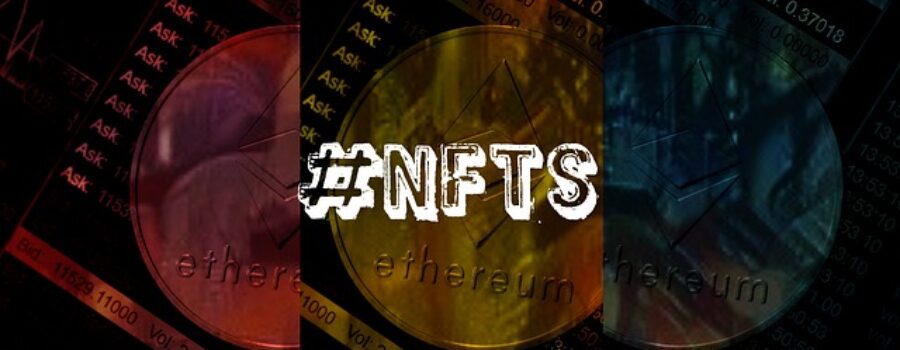Last Updated on November 28, 2022 by Anda Malescu
What is an NFT?
An NFT or a non-fungible token is a unique digital asset that cannot be swapped for an identical replacement. That is unlike fungible digital assets such as bitcoin or other crypto currencies where each digital coin is indistinguishable from another digital coin of the same type.
NFTs are unique and can be traced and verified on a blockchain such as Ethereum. The use of blockchain technology makes it is easy to verify the ownership of an NFT which in turn makes it a verifiable digital certificate of ownership. NTFs represent a digital ownership of something unique such as a video or audio recording or a picture. However, when it comes to larger files, the blockchain is unable to store the actual underlying digital asset.
Simply put an NFT is designed to track the asset by its TokenID and attribute ownership to the current owner. The transaction history of an NFT, starting from the date of minting (the initial creation and recording on blockchain) to the current ownership, are public information.
What is a copyright?
In the United States, copyright is a form of protection, granted by law, for original works of authorship fixed in a tangible medium of expression.
Copyright covers both published and unpublished works. It protects original works of authorship from an unauthorized use. These original works can include among others poetry, novels, movies, songs, computer software, and architecture.
A copyright holder has the right to reproduce the work, prepare derivative works, distribute copies, display the work publicly, and to perform the work publicly.
While copyright registration is voluntary and Copyright exists from the moment the work is created, the work’s author will have to register his or her copyright if they wish to bring a lawsuit for infringement of a U.S. work. Further, registered works may be eligible for statutory damages and attorney’s fees in successful litigation. To learn more visit our copyright and intellectual property page.
How is NFT different from copyright?
NFT are not copyrights and in fact NFTs are different from copyrights.
As mentioned above an NFT is a unique digital certificate of ownership that is recorded on a blockchain. It represents the ownership of a digital asset, while the real asset is often in the form of a hyperlink on the internet. By default, ownership of an NFT of a digital artwork gives its owner the right to sell and display the NFT on a marketplace, to trade it, to give it away, to destroy it and to use it for personal non-commercial purposes.
These rights are identical to purchasing a physical form of art such a painting. NFT is different from copyright because ownership of the NFT does not transfer the underlaying copyright without an explicit agreement.
Is NFT copyrighted?
An NFT purchaser does not automatically acquire the copyrights associated with the original work on which the NFT is based.
Purchasing an NFT conveys a license to use the digital copy of the creative work but does not convey a license to use it for commercial purposes. For an NFT owner to have full copyright of the underlaying artwork and to be able to use it for commercial purposes, the digital governing contract covering the sale of the NFT must expressly provide for an assignment of copyright in a signed writing. Otherwise, the copyright stays with the original owner who will be able to use the artwork for commercial purposes and not the NFT owner.
Thus, when buying an NFT, one should pay close attention to the marketplace’s material terms and conditions and the digital contract that governs the sale of the NFT. Since some NFTs command a high price, we recommend that buyers consult an experienced NFT copyright lawyer before making their final purchase.
I am an NFT artist. How do I protect my work?
If you are an artist who sells unique digital copies of your work by minting NFTs we recommend that you register the copyright to your work with the U.S. Copyright Office. That allows the copyright holder to sue for infringement and potentially be entitled to money for statutory damages and attorney’s fees.
If you are not the original NFT artist of an artwork but are assigned or transferred some or all of the rights related to the artwork and want to mint an NFT we recommend that the transfer or assignment is also recorded with the U.S. Copyright Office.
I am an NFT artist. How do I avoid being sued for violating copyright?
Sometimes NFT artists are unsure what use of another person’s work constitutes a copyright violation. The problem is further compounded by the fact that companies who are major intellectual property holders use sophisticated surveillance software in addition to human staff to look for potential violations of their copyrights.
These companies often have substantial resources to sue potential violators and are not shy to do so. In order to avoid being sued, we recommend that an NFT artist consults with an experienced intellectual property attorney to inquire on possible copyright infringement, prior to minting the NFT.
If you are an NFT artist who is looking to protect unique artwork or want to avoid being sued for copyright violations, contact us, your experienced NFT copyright attorneys in Miami, Florida, USA.
Malescu Law P.A. – NFT Copyright





